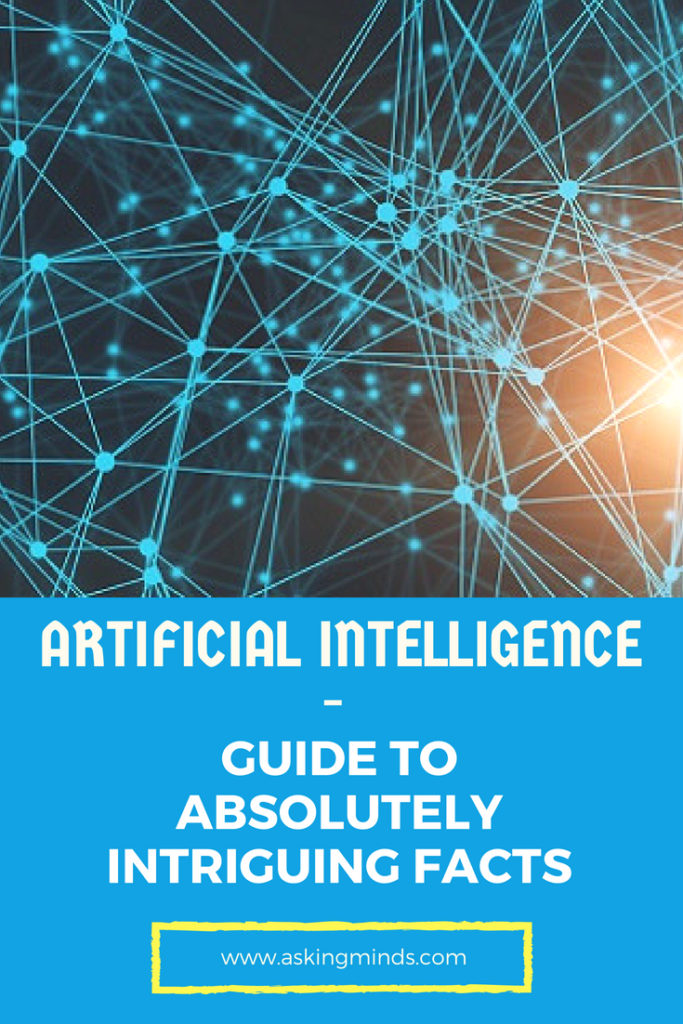Well, I think everyone amongst us has heard about Artificial Intelligence (AI) many times till date. If I am not wrong, whenever you overheard the AI terminology, the only thing that comes to your mind is robotics. But, does AI means robotics only? Actually, it’s not. Robotics is just a part of AI. Except techno geeks very few have the clear idea about: what AI exactly mean or work for. So, without taking much time, we are going to take a small Informative look about it.

What is Artificial Intelligence?
Everyone is familiar with AI terminology. But, if you are reading this blog then you might be looking for something interesting or want to explore more. Basically, AI stands for Artificial Intelligence. But what does it mean? Everyone has their own terminology towards AI. Let’s get started with its conceptual one.
AI comes under the branch of Computer Science which focuses on creating the intelligent machines that are capable enough to gain and apply the knowledge. It also provides the ability to change and adapt according to the requirement like human brain i.e. “learning” and “solving problems”.
History & Evolution of AI
John McCarthy, Marvin Minsky, Allen Newell, and Herbert Simon are the “founding fathers” of Artificial Intelligence. AI was coined by John McCarthy in 1955. Then in 1956, he organized the well known Dartmouth Conference where AI discipline emerged. Since then, it has gained the massive prominence.

AI trending Technologies and Applications –
Nowadays, AI is omnipresent and everyone is getting habitual to it. It is used in Speech and Face recognition systems. It also helps to recommend you the buying stuff in accordance with your buying interests. It’s quite advantageous to spot spam and for detecting the credit card frauds. Virtual assistance such as Apple’s Siri, Amazon’s Alexa, Microsoft’s Cortana, Google’s Google assistants are the most trending technologies.
You might be already aware of these technologies of AI. Are you? If not, then let’s take a quick look towards it. There are numerous AI applications present in the worlds. So, we will take a look at some of the most prominent ones.
- Automation –
As the name suggests, it is the process of doing things automatically. It can be used to perform the high-level repetitive task automatically. For example, if a building catches the fire then the deployed fire alarm automatically gets activated. - Machine Learning –
It is a technique in which computer act without getting explicitly programmed. It offers us the technologies like Speech recognition, Self-driving cars, web search etcetera. - Pattern Recognition –
It comes under the machine learning which mainly focuses on the recognizing of the patterns of data. It is used to identify whether the received email is “spam” or not. - Robotics –
This field particularly focuses on designing and manufacturing of the robots. Often robots are capable enough to do the stuff which is not possible for human beings. For example, it is used by NASA to move the large objects in space. - Machine Vision –
It is the ability of computers to see. It provides an automatic image capturing using a camera and along with analyzing, evaluation and processing capabilities. It is used in a wide range of applications from signature identification to the spying airplane which takes photographs that are used to figure out spatial information or map of the areas. - Natural Language Processing (NLP) –
NLP system processes the input data (text) to understand the meaning of the text i.e. it helps computers to understand, interpret and manipulate human language. Well known example of NLP is spam detection, in which it decides emails authenticity by checking out the content of email and subject line. - Speech Recognition –
Speech recognition systems do the processing of input data (speech) to convert it into text. Speech Recognition is capable enough to handle the different accents, slang words, and variations in human voice due to environmental changes etcetera. Currently, it is used in interactive voice response systems and mobile applications. Apple’s Siri and Google’s Google assistant are the world-famous trending examples. These systems are booming the market with its interactive voice-response. - Gaming –
When it comes to strategic games i.e. Chess, Poker, Go, Tic-tac-toe, etc, AI plays a vital role in it, where machines need to foresee the number of possible ways to find the appropriate ones. - Virtual Agents –
Nowadays most of the industries are widely using the “Chatbots” and all kind of advanced system to ease the work. You can see this on customer support and service as a smart home manager. It also helps the business to do the highly repetitive task very efficiently with process automation technique i.e. Chat bots as customer service. - Biometrics –
The name biometric is originated from the two Greek words “bios” means life and “metrikos” means to measure. It allows a more natural interaction between humans and machines. This is used for unique identification of a person which includes the face recognition, speech, eye retinas, fingerprints, and body language. - Decision Management –
Decision management is nothing but the process or set of processes which is used to improve the decision-making process by using all available up-to-date information. In results, helps to enhance the consistency, accuracy, agility and decision making. It helps in assisting or performing automated decision-making for a wide variety of enterprise applications.
Advantages and Disadvantages of AI –
AI is about designing machines which have the thinking capability. Even, some researchers are also trying to add an emotion to them. Isn’t it cool? They can be a replica of the human being with more power computation capability. Then how it will affect our lives? So, let’s discuss it.
Just like a coin, AI also comes with its two sides to show i.e. good and bad. Not a single work in the world is perfect. Everything has flaws in it. Rather than discussing much we will go straight towards its pros and cons.

Advantages –
- Low error rate – AI diminishes error rate by greater precision.
- Intelligent machines can do hard work such as mining and exploration of natural treasures for in very challenging conditions as well.
- Repetitive tasks can be done by artificially intelligent machines because these machines are smart enough and have very slight error rates while doing repetitive tasks.
- To Create Expert Systems − the systems which show intelligent behavior, learn, demonstrate, explain, and advice its users.
- To Implement Human Intelligence in Machines − Building systems that understand, think, learn, and behave like people.
- Digital assistance
- Speech recognition
- Planning
- Problem-solving
Disadvantages – Amazon has just launched Amazon Go, a cashier-free supermarket in Seattle where customers just take items from the shelves and walk out. What this means, for the more than 3 million people in the US who works as cashiers remain to be seen. By some predictions, the self-driving trucking industry alone is assured to take over 1.7 million jobs in the next decade, even without considering the impact on couriers and taxi drivers. These things have to be taken into consideration. Apart from these, a few common disadvantages are:
- It’s quite expensive when it comes to build, rebuild or repair.
- If the artificially intelligent systems robots replace humans in every field then it will eventually lead to severe unemployment.
- Machines can easily lead to destruction if put in the wrong hands.
- Machines do not get better with experiences as compared to human minds.
Will AI harm us all?
One thing which might come to our mind is that, Will AI harm us in the future? This is really very hard to say, will it be going to harm us or not. I think it varies with a different observation. Let’s discuss further. Actually, it depends upon who you ask. As AI-powered systems have grown more capable, warnings of the downsides have become more serious.
Tesla and SpaceX CEO Elon Musk has claimed that AI is a “fundamental risk to the existence of human civilization”. Similarly, the esteemed physicist Stephen Hawking has warned that once a sufficiently advanced AI is created, it will rapidly advance to the point at which it vastly outstrips human capabilities, a phenomenon is known as the singularity, and could pose an existential threat to the human race.
Yet the notion that humanity is on the verge of an AI explosion that will dominate our intellect seems stupid to some AI researchers.
AI around the globe
“I don’t think most people understand just how quickly machine intelligence is advancing,” Musk said on stage at Vanity Fair’s New Establishment Summit: The Age of Innovation. He also sponsors open AI, “a non-profit AI research company, discovering and enacting the path to safe artificial general intelligence.”
But it would be a big mistake to think the US tech giants have the field of AI sewn up. Chinese firms Alibaba, Baidu, and Lenovo are investing heavily in AI in fields ranging from e-commerce to autonomous driving. As a country, China is pursuing a three-step plan to turn AI into a core industry for the country, one that will be worth 150 billion yuan ($22bn) by 2020.
Baidu has invested in developing self-driving cars, powered by its deep learning algorithm. Baidu AutoBrain, and, following several years of tests, plans to roll out fully autonomous vehicles in 2018 and mass-produce them by 2021. Baidu has also partnered with Nvidia to use AI to create a cloud-to-car autonomous car platform for auto manufacturers around the world.
What will be the future of AI?
Nowadays, we are growing at a huge rate, whether in terms of people, scripted knowledge, tasks etc. Increasing in scale will also increase entropy in the system, demanding a large number of tasks to be automated, and centralized. Human beings will surely get benefits from AI. Though we are seeing automation of tasks is leading to job cutting. In long term, it is going to turn out to be a major benefit.
After around 10–20 years from now, you may find drastic changes within systems. Today, homes are getting smarter than humans, Cars can drive themselves, so it’s safe to expect that Artificial Intelligence has come a long way after it was just an idea.
Google now has their own form of Artificial Intelligence called Deep Learning, which in 2015 doubled in the number of projects using it. A huge focus right now for start-ups and giants alike is to learn how to use AI to help better automate a machine’s ability to solve problems on the fly.
The present world is almost run by Artificial Learning. Siri, Cortana, Alexa and numerous numbers of virtual assistants make our lives much faster.
- Automated Transportation will be the obvious thing.
- Cyborg Technology – One of the main limitations of being human is simply our own bodies—and brains. Researcher Shimon Whiteson thinks that in the future, we will be able to augment ourselves with computers and enhance many of our own natural abilities.
- Robots will take over hazardous jobs like bomb defusing, welding, etc.
- Solving climate change with the help of information they have. It may help us to solve the biggest issue.
- Home robots’ will help elderly people with their day to day work.
- In the future, humans will be able to raise themselves with robots.
- There will be more numbers of smart cities as vehicles, phones, home appliances will be run by AI.
“AI is whatever hasn’t been done yet.” –Larry Tesler
Read more such interesting blog: What is the scientific reason behind hanging of lemon and chilli?






4 Comments
Bharat
(August 8, 2018 - 2:42 AM)Very informative
Asking Minds
(August 8, 2018 - 2:56 AM)Thanks a million, Bharat 🙂
You can also subscribe to our newsletter to keep up to date with our blog posts.
TET PORTAL
(August 29, 2019 - 5:25 AM)Nice post
Asking Minds
(August 29, 2019 - 6:42 AM)Thanks a lot 🙂